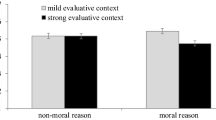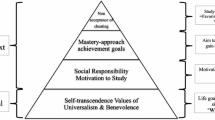Abstract
Three studies explored the influence of self-evaluation in one domain (e.g., the academic domain) on self-evaluation in another domain (e.g., morality), assuming a process of intra-personal dimensional comparisons (i.e., comparisons between self-evaluations in two different domains). A pre-study with N = 143 university students replicated the ‘Muhammad Ali effect’, that is, the tendency to rate one's own honesty higher than one's own intelligence. As suggested in our assumptions regarding dimensional comparisons, Study 1 (N = 70) then showed that low self-concept students rated their honesty slightly more positive than high self-concept students. More important, in Study 2 (N = 64) participants who just experienced academic failure in an experimental task rated their honesty slightly more positive than students who experienced academic success. Therefore, it was demonstrated that academic outcome influenced self-concept in a non-academic domain. Results are discussed with regard to their implications for the extension of the I/E model.
Similar content being viewed by others
References
Ali, M. (1975). The greatest. My own story. New York: Random House.
Allison, S.T., Messick, D.M., & Goethals, G.R. (1989). On being better but not smarter than others: The Muhammad Ali effect. Social Cognition, 7, 275–296.
Bong, M. (1998). Tests of the internal/external frames of reference model with subject-specific academic self-efficacy and frame-specific academic self-concepts. Journal of Educational Psychology, 90, 102–110.
Collins, R.L. (1996). For better or worse: The impact of upward social comparisons on self-evaluations. Psychological Bulletin, 119, 51–69.
Festinger, L. (1954). A theory of social comparison processes. Human Relations, 7, 117–140.
Goethals, G.R. (1986). Social comparison theory: Psychology from the lost and found. Personality and Social Psychology Bulletin, 12, 261–278.
Guay, F., Bovin, M., & Hodges, E.V.E. (1999). Social comparison processes and academic achieve-ment: The Dependence of the development of self-evaluations on friends' performance. Journal of Educational Psychology, 91, 564–568.
Hau, K.T., Kong, C.K., & Marsh, H.W. (2000). Extension of the internal/external frame of reference model of self-concept formation: Importance of native and nonnative languages for Chinese students. Paper presented at the AERA Conference, April 2000, New Orleans.
Holtgraves, T. & Dulin, J. (1994). The Muhammad Ali effect: Differences between African Americans and European Americans in their perceptions of a truthful bragger. Language and Communication, 14, 275–285.
Jerusalem, M. (1984). Selbstbezogene Kognitionen in schulischen Bezugsgruppen [Self-evaluative cognitions in academic reference groups. A longitudinal study]. Berlin: Free University.
Liebrand, W.B., Messick, D.M., & Wolters, F.J. (1986). Why we are fairer than others: A cross-cultural replication and extension. Journal of Experimental Social Psychology, 22, 590–604.
Marsh, H.W. (1986). Verbal and math self-concepts: An internal/external frame of reference model. American Educational Research Journal, 23, 129–149.
Marsh, H.W. (1987). The big-fish-little-pond effect on academic self-concept. Journal of Educational Psychology, 79, 280–295.
Marsh, H.W. (1990). Influences of internal and external frames of reference on the formation of math and English self-concepts. Journal of Educational Psychology, 82, 107–116.
Marsh, H.W., Byrne, B.M., & Shavelson, R.J. (1988). A multifaceted academic self-concept: Its hier-archical structure and its relation to academic achievement. Journal of Educational Psychology, 80, 366–380.
Marsh, H.W. & Craven, R. (1997). Academic self-concept. Beyond the dustbowl. In G.D. Phye (Ed.), Handbook of classroom assessment. San Diego, CA: Academic Press; pp. 131–198.
Marsh, H.W. & O'Neill, R. (1984). Self Description Questionnaire III (SDQ III): The construct validity of multidimensional self-concept ratings by late adolescents. Journal of Educational Measurement, 21, 153–174.
Marsh, H.W. & Shavelson, R.J. (1985). Self-concept: Its multifaceted, hierarchical structure. Educational Psychologist, 20, 107–125.
Marsh, H.W., Walker, R., & Debus, R. (1991). Subject-specific components of academic self-concept and self-efficacy. Contemporary Educational Psychology, 16, 331–345.
Marsh, H.W. & Yeung, A.S. (1998). Longitudinal structural equation models of academic self-concept and achievement: Gender differences in the development of math and English constructs. American Educational Research Journal, 35, 705–738.
Messick, D.M., Bloom, S., Boldizar, J.P., & Samuelson, C.D. (1985). Why we are fairer than others. Journal of Experimental Social Psychology, 21, 480–500.
Möller, J. & Köller, O. (2000). Spontaneous and reactive attributions according to academic achievement. Social Psychology of Education, 4, 67–86.
Möller, J. & Köller, O. (2001a). Frame of reference effects following the announcement of exam results. Contemporary Educational Psychology, 26, 277–287.
Möller, J. & Köller, O. (2001b). Dimensional comparisons: An experimental approach to the internal/external frame of reference model. Journal of Educational Psychology, 93, 826–835.
Reuman, D.A. (1989). How social comparison mediates the relation between ability grouping practices and students' achievement expectancies in mathematics. Journal of Educational Psychology, 81, 178–189.
Sedikides, C. & Strube, M.J. (1997). Self-evaluation: To thine own self to be good, to thine own self be sure, to thine own self be true, and to thine own self be better. In M.P. Zanna (Ed.), Advances in experimental social psychology (Vol. 29). New York: Academic Press; pp. 209–269.
Shavelson, R.J., Hubner, J.J., & Stanton, G.C. (1976). Self-concept: Validation of construct interpretations. Review of Educational Research, 46, 407–444.
Skaalvik, E.M. & Rankin, R.J. (1990). Math, verbal, and general academic self-concept: The in-ternal/ external frame of reference model and gender differences in self-concept structure. Journal of Educational Psychology, 82, 546–554.
Skaalvik, E.M. & Rankin, R.J. (1992). Math and verbal achievement and self-concepts: Testing the internal/external frame of reference model. Journal of Early Adolescence, 12, 267–279.
Skaalvik, E.M. & Rankin, R.J. (1995). A test of the internal/external frame of reference model at different levels of math and verbal self-perception. American Educational Research Journal, 32, 161–184.
Suls, J.M. & Miller, R.L. (1977) (Eds.), Social comparison processes: Theoretical and empirical perspectives. Washington, DC: Hemisphere.
Tesser, A. (1988). Toward a self-evaluation maintenance model of social behavior. In L. Berkowitz (Ed.), Advances in experimental social psychology (Vol. 21). San Diego, CA: Academic Press; pp. 181–227.
Van Lange, P.A.M. (1991). Being better but not smarter than others: The Muhammad Ali effect at work in interpersonal situations. Personality and Social Psychology Bulletin, 17, 690–694.
Van Lange, P.A.M. & Kuhlman, D.M. (1994). Social value orientations and impressions of other's honesty and intelligence: A test of the might versus morality effect. Journal of Personality and Social Psychology, 67, 126–141.
Van Lange, P.A.M. & Sedikides, C. (1998). Being more honest but not necessarily more intelligent than others: Generality and explanations for the Muhammad Ali effect. European Journal of Social Psychology, 28, 675–680.
Wills, T.A. (1981). Downward comparison principles in social psychology. Psychological Bulletin, 90, 245–271.
Wood, J.V. (1989). Theory and research concerning social comparisons of personal attributes. Psychological Bulletin, 106, 231–248.
Wood, J.V., Taylor, K.L., & Lichtman, R.R. (1985). Social comparison in adjustment to breast cancer. Journal of Personality and Social Psychology, 49, 1169–1183.
Author information
Authors and Affiliations
Corresponding author
Rights and permissions
About this article
Cite this article
Möller, J., Savyon, K. Not Very Smart, thus Moral: Dimensional Comparisons Between Academic Self-Concept and Honesty. Social Psychology of Education 6, 95–106 (2003). https://doi.org/10.1023/A:1023247910033
Issue Date:
DOI: https://doi.org/10.1023/A:1023247910033




